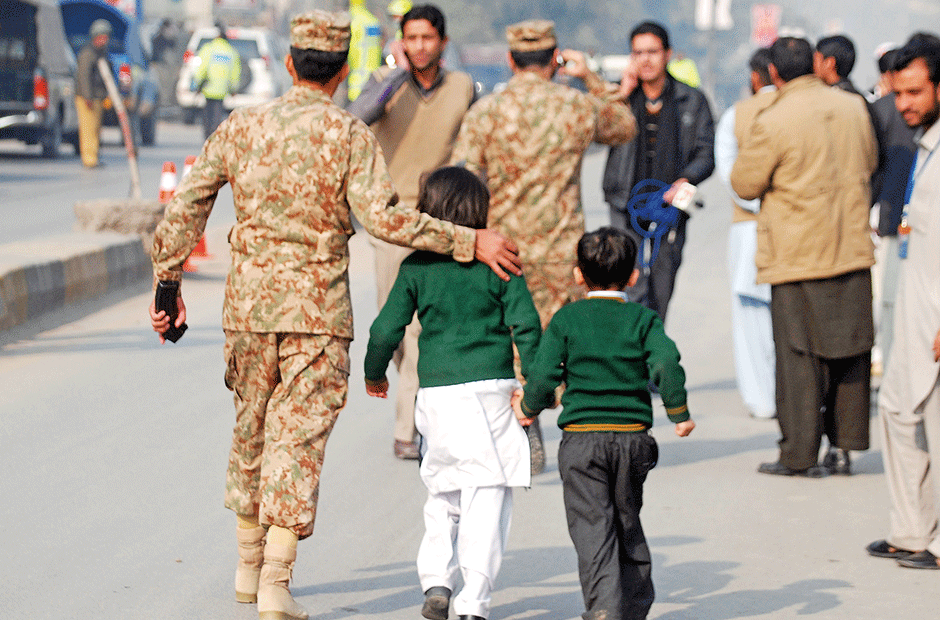The Pakistan Army launched a new military offensive Operation Radd-ul-Fassad in February after a fresh wave of terrorist attacks across the country. The new military operation is being billed as the grand finale of a campaign to eliminate terrorism from Pakistan.
A spokesperson of Inter-Services Public Relations (ISPR), the Pakistan army’s media wing, said that Radd-ul-Fasaad, which means “elimination of discord or evil”, aims at indiscriminately eliminating the “residual/latent threat of terrorism”, consolidating the gains made in other military operations, and further ensuring the security of Pakistan’s borders. Radd-ul-Fassad is a continuum of Operation Zarb-e-Azb, which broke the back of terrorists in the troubled areas of Pakistan, especially the tribal belt along Afghanistan.
It is a strategic shift from kinetic operations that relatively stabilised the bordering region of Federally Administered Tribal Areas (FATA) to combing operations throughout Pakistan.
Renewed efforts
Pakistan’s Army Chief General Qamar Javed Bajwa said that the security agencies would crackdown on all troublemakers under the military campaign Operation Radd-ul-Fasaad across the country. “Through Operation Radd-ul-Fasaad, we will take on all fasaadis (troublemakers) and play our part in bringing back normalcy in our country,” he said in a statement.
The fresh military offensive and combing operation was launched on February 22 after a series of militant attacks in the country killed more than 125 people. Most deadly among them was the suicide bombing at the famed Sufi shrine of Lal Shabaz in the southern Sindh province in which 88 people died. Pakistan Air Force, Pakistan Navy, Civil Armed Forces (CAF) and other security and law enforcing agencies (LEAs) are actively participating in and supporting the armed forces’ efforts to eliminate the menace of terrorism from the country, said an ISPR spokesperson.
As part of the National Action Plan (NAP), which was also formed in 2014 to eliminate terrorism, jurisdiction of military courts has been extended to fast-track terrorism cases. Intelligence-based operations across the country were initiated to disrupt and destroy terror networks in urban and rural areas. The plan had also laid an emphasis on curtailing terror financing.
The plan envisaged countering hate speech and extremist material through the powers vested in the provincial police and other authorities. Regulatory authorities were tasked with checking and banning glorification of terrorism and militant groups through print and electronic media. The provinces were further instructed under NAP to raise a counter-terrorism force under a dedicated command structure.
Political backing
According to official reports in Pakistan, more than 85,000 people in Pakistan have lost their lives in the war against terrorism while the country has suffered estimated economic losses of $120 billion (Dh440 million). Institute of Conflict Management statistics reveal that a total of 61,847 people have lost their lives in terror-related incidents between 2003 and March 5, 2017.
This includes 21,642 civilians, 6,703 security personnel and 33,502 terrorists. Given the statistics, Pakistan should be the last country to be lectured on how to conduct antiterrorism operations at strategic and operational levels.
Since the launch of the new military operation, which involves all the security agencies and massive combing work across the country, terrorists and their financers and supporters are on the run. The military offensive has also got strong political backing as Prime Minister Nawaz Sharif said that Operation Radd-ul-Fassad would continue until terrorism is eliminated from the country.
“Armed forces are fighting the menace of terrorism to protect the country. We cannot and will not allow our enemies to promote their nefarious designs in a bid to destablise the country,” Sharif said in a recent statement.
TIMELINE OF MILITARY OPERATIONS IN PAKISTAN
Operation Rah-i-Haq-I in Swat valley and Shangla district (2007)
Operation Rah-i-Haq-II in Swat valley and Shangla (2008)
Operation Sirat-i-Mustaqeem in Khyber Agency (2008)
Operation Sherdil in Bajaur Agency (2008)
Operation Rah-i-Haq-III in Swat valley and Shangla (2009)
Operation Black Thunderstorm in Buner, Lower Dir and Shangla district (2009)
Operation Brekhna in Mohmand Agency (2009)
Operation Rah-i-Rast, commonly known as Swat Operation (2009)
Operation Rah-i-Nijat in South Waziristan (2009)
Operation Zarb-i-Azb in North Waziristan along the Pakistan-Afghanistan border (2014)
Operation Radd-ul-Fasaad across the country (2017)









